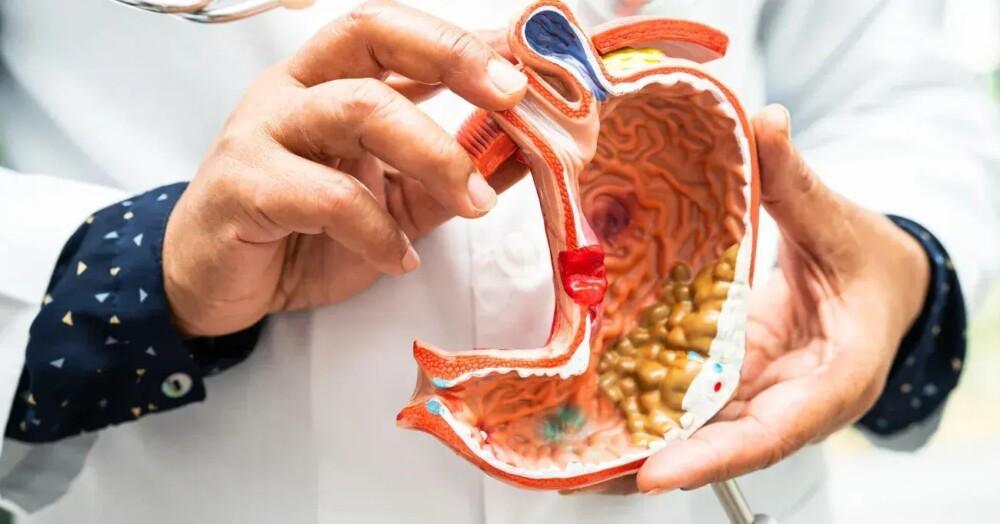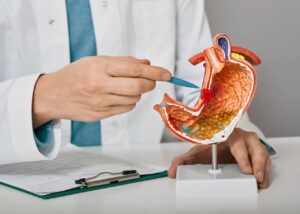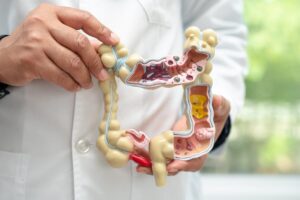
Understanding SIBO: Causes, Symptoms, and Naturopathic Treatments
SIBO is a condition that leads to discomfort, continuous bloating, and digestive problems. According to studies published by Barbara Skrzydło-Radomańska on How to Recognize and Treat Small Intestinal Bacterial Overgrowth, the prevalence of SIBO is between 2.5% and 22%.
SIBO is not a life-threatening condition, but its presence can be frustrating and an annoyance. It’s important for patients to understand the causes and symptoms, so they know how to manage and treat the condition.
This article will offer more information on SIBO and how to treat it effectively.
What is SIBO and How Does It Disrupt Gut Function?
SIBO is short for Small Intestine Bacterial Overgrowth. This is a condition where there’s an unusual increase in small intestine bacteria. The large intestine is supposed to have a higher concentration of bacteria than the small intestine.
According to studies at the University Medical Centre Groningen, the small intestine microbiota is estimated to have between 103 and 108 cells/gram. The bacteria are essential for digestion, but their overgrowth leads to dysfunction of the GI tract.
Digestion in the small intestine involves breaking down food into basic components. This way, nutrients are easily absorbed.
When you have SIBO, however, the gut bacteria start to ferment carbohydrates instead. The fermentation of undigested foods leads to gas, which causes symptoms such as bloating or even pain.
What Are the Most Common Symptoms of SIBO?
The most common symptoms of SIBO include bloating, constipation, gas, diarrhea, stool changes, and abdominal pain.
Bacterial overgrowth leads to fatigue, nausea, and brain fog as well. They worsen after a meal, with the symptom severity depending on the gas type: hydrogen, methane, and hydrogen sulfide.
What Causes Bacteria to Overgrow in the Small Intestine?
Bacterial changes mostly happen in the small intestine when reduced motility enables overgrowth. This is frequently caused by abdominal adhesions from surgeries. Proton Pump Inhibitors (PPIs) suppress acid in the stomach, which controls the colonization of gut bacteria.
Changes in the Migrating Motor Complex (MMC) also lead to bacterial overgrowth. The contraction system uses migrating waves to move bacteria from the small to the large intestine between meals.
When the MMC is not functioning correctly, it leaves behind bacteria that potentially lead to overgrowth.
Conditions such as IBS, hypothyroidism, and diabetes potentially worsen bacterial overgrowth. According to a study published in 2024 by Purna Kashyap, Paul Moayyedi, and more, an average of 80% of IBS patients test positive for SIBO.
Is There a Reliable Test for Diagnosing SIBO
The most reliable options for diagnosing SIBO are breath tests. These can be glucose and lactulose, and they detect methane and hydrogen gas. The patient ingests a sugar substrate, which feeds the small intestine bacteria.
The sugar ferments, and the bacteria emit hydrogen and other gases. These travel through the body until they reach the lungs and out of the mouth.
Positive results suggest an overgrowth of bacteria, but diagnostic sensitivity leads to limitations. Antibiotics can suppress SIBO bacteria, leading to false negatives. If the sugar gets into the colon too quickly, the LI fermentation mimics SI activity. This results in false positives, so timing is important.
Jejunal aspirate became a common gold standard. This takes a fluid sample from the small intestine and cultures it to count bacterial colonies. Cultures above 10³ CFU/ml are suggestive of SIBO.
According to a study on the Epidemiology of Small Intestinal Bacterial Overgrowth, breath tests give 20.8% of diagnoses. In contrast, culture-based tests identify SIBO in 12.6% of patients.
How Do Naturopathic Doctors Treat SIBO?

Naturopaths can treat SIBO using herbal antimicrobials such as oregano oil, berberine, allicin, neem extract, etc. Some may use pharmaceutical antimicrobials such as rifaximin.
Treatment goes through three different phases: kill, heal, and restore. These evolve as follows:
- Reduction Phase: Antimicrobial herbs kill bacteria and bring the microbiota to a balanced level
- Repair Phase: Restores gut lining with zinc and L-glutamine, and treatment protocols support healing. This phase can also be done before the killing phase to support the overall terrain of the gut, as well as then during the anti-microbial phase as well. Your Naturopathic Doctor will suggest the best plan of action for you.
- Maintenance: Long-term tailored treatment offers symptom management and restores long-term gut motility.
Naturopathic protocol depends on the gas type, symptoms, cause, and response to previous treatments. Combination treatments are common for long-term management. Naturopaths may recommend abdominal massage, stress management, and personalized diets to prevent a recurrence.
What Role Does Diet Play in SIBO Treatment?
Diet supports SIBO treatment by limiting the fermentability. Naturopaths can suggest eliminating fermentable carbohydrates that support bacterial fermentation. This offers symptom control as diets restrict fuel.
Common diets include:
- Low-FODMAP Diet: Reduces fermentable oligosaccharides, disaccharides, monosaccharides, and polyols from one’s diet. It’s mostly common in the “kill” phase because food triggers fermentation.
- SIBO-Specific Diet: Developed by Allison Siebecker, it combines SCD and FODMAP diets. It reduces fermentable fibers and complex starches to support gut healing.
- Elemental Diet: Involves pre-digested nutrients that nourishes the host while starving the bacteria. Studies at the Cedars-Sinai Medical Center show it can reduce gas levels by up to 85% in 14 to 21 days.
Patients should be wary of long-term dietary restrictions. These can lead to lower microbial diversity and nutritional deficiency. To meet dietary compliance, consider daily reintroduction of prebiotic fibers after healing.
Can SIBO Come Back After Treatment?
SIBO returns after treatment if the maintenance was not appropriate. Poor motility leads to relapse, so an unbalanced microbiota can lead to bacterial colonization. Incomplete eradication is suggestive of treatment failure, and the harmful bacteria can grow back.
According to studies at the Aventura Hospital and Medical Center by Sufian J. Sorathia, 45% of SIBO patients see their symptoms return after treatment completion. Chronic SIBO is more common in older individuals with poor gut lining.
Chronic stress affects the gut-brain axis, which further suppresses motility. This creates a vulnerable environment for the bacteria to grow back.
Common prevention strategies include:
- Use of prokinetics (e.g., ginger or prucalopride) to improve gut motility
- L-glutamine and zinc carnosine treatments to heal the gut lining
- Stress reduction techniques such as meditation or acupuncture
- Avoiding triggers such as alcohol
- Gradual introduction of fermented foods and prebiotic fibers to restore flora
SIBO can become chronic in individuals with autoimmune conditions or gut abnormalities. Ongoing treatment cycles may be recommended to support good motility.
Should You Use Probiotics During SIBO Treatment?
You should use probiotics during SIBO treatment only if the specialist recommends it. Probiotics are effective in restoring gut health, but timing is an essential factor.
Strains such as Lactobacillus and Bifidobacteria potentially add more fuel to the fire in your gut. This is bad when you already have a poor microbiome balance. With time, the gas production potential increases and worsens symptoms such as bloating or brain fog.
Probiotics repopulate gut bacteria, so they are more helpful in the post-treatment phase. Common strains used post-treatment include:
- Saccharomyces Boulardii: Supports proper functioning of the gut lining
- Bifidobacterium Infantis & B. longum: Ease bowel irregularities
- Lactobacillus Plantarum: Reduces gas and inflammation
Caution is recommended during active treatment to prevent the risk of feeding overgrowth. A naturopath can determine whether or not it’s essential by assessing gas type, symptoms, and tolerance to other treatments. There are blends you can use with certain strains that do not exacerbate SIBO. Our Naturopathic Doctors can help figure out the right blend for you.
What Is the Gut-Brain-SIBO Connection?
Studies done at the Faculty of Medicine of Tishreen University and other affiliates on gut microbiota and neurotransmitters show that 90% of the serotonin occurs in the gut. When there’s an overgrowth, the bacteria impact mood by reducing serotonin levels.
This can lead to symptoms such as:
- Low mental clarity and brain fog
- Poor emotional state
- Low mood and irritability
- Sleep disruptions
- Depression and anxiety
The vagus nerve is an important link in the gut-brain axis. It delivers messages from the gut to the brain and vice versa. Inflammation (which frequently occurs in SIBO) modifies brain chemistry and changes the way you perceive stress.
This modification leads to an increase in cortisol levels. The effect slows the MMC function and weakens the gut barrier. Stress worsens symptoms like gas, bloating, and IBS-like pain.
How Can You Tell If SIBO Is Causing Nutrient Deficiencies?

You can tell if SIBO blocks absorption of nutrients by following symptom indicators and taking blood tests. SIBO typically leads to deficiency of the following:
- Vitamin B12: Symptoms include fatigue and brain fog
- Iron: Symptoms include pale skin, anemia, cold hands/feet, hair thinning, and weakness, shortness of breath, fatigue
- Fat-soluble vitamins such as ADEK: Symptoms include poor vision, frequent infections, muscle weakness, and easy bruising
You can check for nutrient deficiencies in bloodwork.
Maldigestion happens because the gut lining is compromised as a result of inflammation. Damage reduces the absorption area, and bacteria also consumes the nutrients before you have a chance to absorb them.
What Are Biofilms and Why Do They Make SIBO Harder to Treat?
A biofilm is a survival layer that bacteria create to shield themselves from your immune system and potential treatments. This sticky matrix makes SIBO harder to treat, as herbal antimicrobials and pharmaceuticals can’t get past that shield.
Bacteria can communicate and exchange genetic material in this biofilm, even when dormant. It also makes them less vulnerable to antibiotics and herbs, increasing herbal resistance.
Naturopaths use integrative protocols and strategies to break the biofilm, such as proteolytic enzymes. These enzymes disrupt the film by targeting the protein components. A naturopath can rotate film disruptors with antimicrobial herbs to prevent resistance.
In our experience…
Many patients come to us after visiting convention MD’s and Gastroenterologists where they have been prescribed multiple rounds of antibiotics. Most of them may feel better temporarily, but usually have symptoms come back.
The same can even be said for herbal antimicrobials.
It is important to find a Naturopathic Doctor, like the ones at Naturally Sue Wellness that look into your entire history and case, not just killing bacteria.
Sometimes patients have mycotoxin exposure and have been living in a water damaged building and mold which can be contributing or causing their SIBO. While antimicrobial therapy may be indicated, it is only a piece of the treatment puzzle.
When patients are relying solely on antimicrobial treatment and not treating the terrain of their gut and looking into outside factors that can be causing or contributing, it ends up in a vicious, time consuming and expensive cycle.
Comprehensive stool analysis is helpful because it looks at key values in the microbiome that can also help in having your practitioner make you a thorough plan that is addressing the root cause.
- Post Title : Understanding SIBO: Causes, Symptoms, and Naturopathic Treatments
- Author: Dr. Sparks, N.D
- Clinically reviewed by - Dr. Susan Cucchiara, N.D.
- Date Published :


